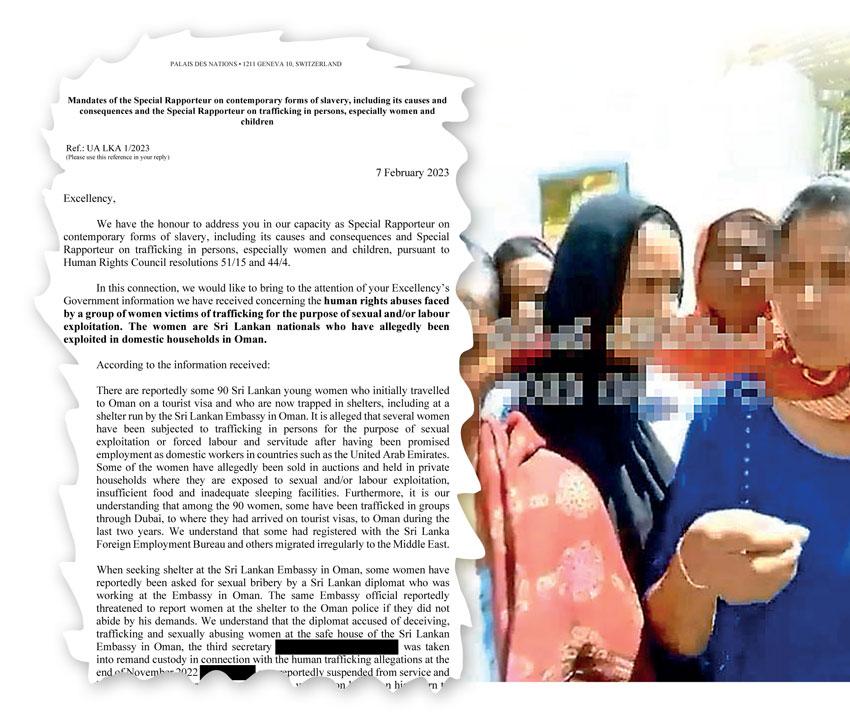Govt. fails to respond even after 60 days
EXCLUSIVE

 Shanthi Pushparaja (Real name withheld), mother of three children who was taken to Oman promising a job as a house maid is one of those nearly 90 Sri Lankan women who went to the Middles East and ended up in Oman with no way to come back home. Shanthi’s husband who was living in the North and looking after the three children, died suddenly leaving no one to look after the three kids.
Shanthi Pushparaja (Real name withheld), mother of three children who was taken to Oman promising a job as a house maid is one of those nearly 90 Sri Lankan women who went to the Middles East and ended up in Oman with no way to come back home. Shanthi’s husband who was living in the North and looking after the three children, died suddenly leaving no one to look after the three kids.
During father’s funeral two-year-old youngest son had gone missing and there is no news about him upto date. A family relative managed to handover two elder children to a children’s home. The agonising mother is pleading Sri Lankan authorities to allow her to return to Sri Lanka as now she has lost her husband and one of her children has gone missing.
This is one of the pathetic stories of Sri Lankan women who are stranded in Oman. A media report relating to a group of Sri Lankan housemaids revealed last November that nearly 90 women are stranded in Oman and some of them have been auctioned as sex slaves, one of the most disturbing factors in the modern world.
The tragic news had shocked the world and the United Nations’ Human Rights Council has initiated a probe through Tomoya Obokata, Special Rapporteur on Contemporary Forms of Slavery, including its Causes and Consequences and Siobhán Mullally, the Special Rapporteur on Trafficking in Persons. They have issued a report dated February 7, 2023 and sent it to Sri Lankan President, Ranil Wickremesinghe seeking some of the salient information relating alleged human rights violation. Even though Sri Lankan government was supposed to respond to the report within 60 days, so far no responses has been sent.
The two Special Rapporteurs who had signed the report has informed President Wickremesinghe about the information on the human rights abuses faced by the Sri Lankan women victims who were trafficked to Oman for the purpose of sexual or labour exploitation.
In their communication the UN Rapporteurs have informed Sri Lanka President that according to the information received there are reportedly some 90 Sri Lankan women who initially travelled to Oman on a tourist visa and who were trapped in shelters, including at a shelter run by the Sri Lankan Embassy in Oman. “It is alleged that several women have been subjected to trafficking in persons for the purpose of sexual exploitation or forced labour and servitude after having been promised employment as domestic workers in countries such as the United Arab Emirates”.
“Some of the women have allegedly been sold in auctions and held in private households where they are exposed to sexual and/or labour exploitation, insufficient food and inadequate sleeping facilities. Furthermore, it is our understanding that among the 90 women, some have been trafficked in groups through Dubai, where they had arrived on tourist visas and then were taken to Oman during the last two years. We understand that some had registered with the Sri Lanka Foreign Employment Bureau and others migrated irregularly to the Middle East.
“When seeking shelter at the Sri Lankan Embassy in Oman, some women have reportedly been asked for sexual bribery by a Sri Lankan diplomat who was working at the Embassy in Oman. The same Embassy official reportedly threatened to report women at the shelter to the Oman police if they did not give in to his demands”.
“We understand that the diplomat accused of deceiving, trafficking and sexually abusing women at the safe house of the Sri Lankan Embassy in Oman, was taken into remand custody in connection with the human trafficking allegations at the end of November 2022. He was reportedly suspended from service and his diplomatic passport was revoked but he was given bail onhis return to Sri Lanka. We understand that other individuals who were allegedly involved in the trafficking of women to Oman have also been arrested.
“We are concerned at these reports of trafficking in persons, violence against women and forced labour, committed against migrant women from Sri Lanka, and the involvement of at least one Government official in trafficking of persons between Sri Lanka and Oman, as well as the abuse of women at the shelter run by the Sri Lankan Embassy and the inadequate conditions and lack of protection reported at the shelter. We are also concerned at the lack of access to effective remedies for these victims, and the limited information available on the investigations undertaken and international cooperation to date” the report indicated.
The situations described may be defined as trafficking in persons for the purposes of sexual exploitation and/or forced labour as per the definitions set forth in article 3 of Protocol to Prevent, Suppress and Punish Trafficking in Persons, Especially Women and Children (the Palermo Protocol), supplementing the United Nations Convention against Transnational Organized Crime, acceded by Sri Lankan Government on 22 September 2006, and article 2 of the Forced or compulsory labour is defined in the International Labour Organization (ILO) Forced Labour Convention, 1930 (No. 29), ratified by Sri Lankan Government on 5 April 1950.
The human rights violations reported also constitute indicators of forced labour as established by the ILO, including the following: Abuse of vulnerability; deception; restriction of movement; isolation; physical and sexual violence; intimidation and threats; retention of identity documents; withholding of wages; debt bondage; abusive working and living conditions and excessive overtime.
Reiterating the major setback relating to the management of Sri Lankan migrant workers sometime by the respective Sri Lankan foreign missions themselves, the report reminded some of the concerns expressed by Tomoya Obokata the Special Rapporteur on contemporary forms of slavery. He visited Sri Lanka in November 2021.
On a report issued following his visit Mr. Obokata had pointed to gaps in the current migration management system in Sri Lanka. “many women who worked as domestic workers in various destination countries reported instances of abuse and exploitation in the workplace, ranging from the withholding of identity documents and wages to long working hours and physical, verbal and/or sexual abuse. While the primary responsibility for addressing these abuses rests with destination countries, there appears to be insufficient support provided by Sri Lankan embassies and consulates. Not all officials are said to be trained adequately, and there are reports of migrant workers being turned away after seeking assistance.
While there are established shelters in some destination countries, these have been regarded as insufficient. The situation has been exacerbated by the COVID-19 pandemic, which led to a large number of workers being stranded without access to adequate institutional support.” In the same report, the Special Rapporteur also urged the Government to ensure the protection of migrant workers from exploitation and abuse.
Considering the urgency of the matter relating to Sri Lankan migrant workers harassed and stranded in Oman, two Special Rapporteurs had urged Sri Lankan government to safeguard the rights of the female in compliance with international instruments.
Acting under the mandates provided by the Human Rights Council, to seek to clarify all cases brought to their attention, they had sought observations of the Sri Lankan government of the following;
1. provide any additional information and any comment Sri Lankan may have on the above mentioned allegations.
2. provide details, and where available the results, of any investigations, prosecution or criminal charges, and other inquiries carried out in relation to the allegations, and the methods of international cooperation with the country of destination (Oman);
3. indicate what measures are taken to ensure the safe and voluntary return of the women victims of trafficking in persons for purposes of forced labour and sexual exploitation to Sri Lanka and how these measures ensure a safe and voluntary return; with ongoing measures of social inclusion, assistance and protection;
4. indicate which channels/protocols for reporting human rights violations to Sri Lankan Embassies exist and how Sri Lankan Government is ensuring that complaints can be submitted safely, without fear of retaliation , and what training is in place for diplomatic and consular officials on the prevention of misconduct such as exploitation
and abuse; identification of victims of trafficking and on assistance and
protection obligations, in particular for women migrant workers;
5. elaborate how the victims of trafficking and their families in Sri Lanka are protected from retaliation after having reported the trafficking and abuse suffered;
6. indicate what types of assistance (regarding access to health services, food, legal and socio-social support, etc) victims of trafficking and labour/sexual exploitation receive at the shelter run by the Embassy of Sri Lanka in Oman;
7. provide information on the measures being taken to ensure compliance with the State’s obligation of due diligence to prevent trafficking of women migrant workers, including through addressing the gender dimensions of risks of trafficking in persons and to ensure early identification, effective access to protection, and access to effectives remedies, including to compensation;
8. provide information on measures taken to monitor offers of employment, to ensure that work contracts are valid and protect women’s rights on a basis of equality with men in countries of destination, and to provide assistance to women workers on arrival at their destinations, in accordance with the obligations states for countries of origin in CEDAW GR no.26.
9. provide information on measures to strengthen cooperation between the Government of Oman and your Excellency’s Government in cross-border trafficking cases;
10. specify what policies and other measures are in place regarding the prohibition of misconduct of Sri Lankan diplomatic personnel and to what extent monitoring and oversight is carried out by the Government;
11. specify what measures are being taken to ensure safe and regular migration for employment opportunities for women, prior to departure from Sri Lanka;
12. specify what measures are taken to support the role of civil society in prevention of trafficking in persons from Sri Lanka, particularly of women migrant workers, and in identification, and protection of victims of trafficking and other forms of exploitation, including through survivor-led initiatives and programmes.
Two Special Rapporteurs who urged Sri Lankan government for all necessary interim measures be taken to halt the alleged violations and prevent their re-occurrence and in the event that the investigations support or suggest the allegations to be correct, to ensure the accountability of any person responsible for the alleged violations. While sharing the same report with the Government of Oman, they further assured that any response received from Sri Lanka would be made public within 60 days.
According to the information received by Daily Mirror Sri Lanka, even after 60 days has not so far responded to the communication by two Special Rapporteurs.
More than 50 women and their family members who have stranded in Oman had complained to the Women Action Network seeking justice for the agonising plight they are going through.
“This is a big racket. There are Sri Lanka men who are working as sub-agents in Oman and rotating these women from house to house,” said Shreen Saroor who is the Co-Founder of Women’s Action Network, an organisation working for the right of women.
“The agents would not give the passports of these women and the women even don’t know that they have overstayed. Once a women had run away from one house and when she got onto a taxi and asked to be dropped at Sri Lankan embassy she was handed over to a police station by the driver,” Saroor described the desperate situation of Sri Lankan women in Oman.
Responding to a request made by Ms. Saroor, Sri Lanka Foreign Employment Bureau (SLFEB) said that it has taken appropriate mearures to address the issue encountered by the female workers.
“However still many Sri Lanka females are going through informal channels to Oman violationg the rules and regulations wth regard to migration industry risking their lives,” The SLBFE also has stated that it had repatriated nearly 100 female workers from Oman and out of them, the SLFEB had paid return air ticket cost for more than 40 individuals.
The response signed by Deputy General Manager- Foreign relations for Chairman also said that with regard to suspected Third Secretary, Employment and Welfare, E. Kushan, the domestic inquiry is conducted by the orgnaisation.
Agents should be held responsible; SL Ambassador in Oman
Responding to the incident of group of victim housemaids being stranded in Oman, Sri Lankan Ambassador at Muscat in Oman, said that they are at a safe house run by the SLFEB. He said following sending off of suspected third Secretary E. Kushan, now there is a lady officer as in charge of the safe house.
He said that the main problem faced by the Embassy right now is sending back those who had come on visit visas.
“When a person on visit visa overstayed (more than one month),10 Rial or around Sri Lankan Rs. 8500 per day has to be paid as a penalty. We appealed on behalf of those overstayed and Omani government was good enough to cancel and repatriated around 200 people within this year alone,’ the Ambassador said.
“But people who come on employment visa it is a contract between the employment agent and the employer. If he files a case against the housemaid who wants a premature termination of the employment contract, it causes a huge financial loss to the employer. It is a dispute between the house maid and the employer.But in this instance the SLFEB should ensure that the agent should be responsible for the contract and not the housemaid. If the housemaid wants to return or terminate her job, the agent should be asked to pay from his commission. Instead what is happening right now is agent is seeking big sums like Rs. One million from the family of housemaid and harassing her and the family members. There should be a mechanism to return the commission taken by the agent and release the housemaid,” he said.
The Ambassador insisted that the Sri Lanka police should be strict with these foreign agents who harass the housemaids and their families.
He also said that the SLFEB’s decision not to allow those unregistered workers to safe house facilities has created a big problem for the embassy. “If a housemaid come and say she doesn’t have a place we have to provide an accommodation and we have a responsibility to help them”.
Attempts to contact Labour and Foreign Employment Minister Manusha Nanayakkara failed.

